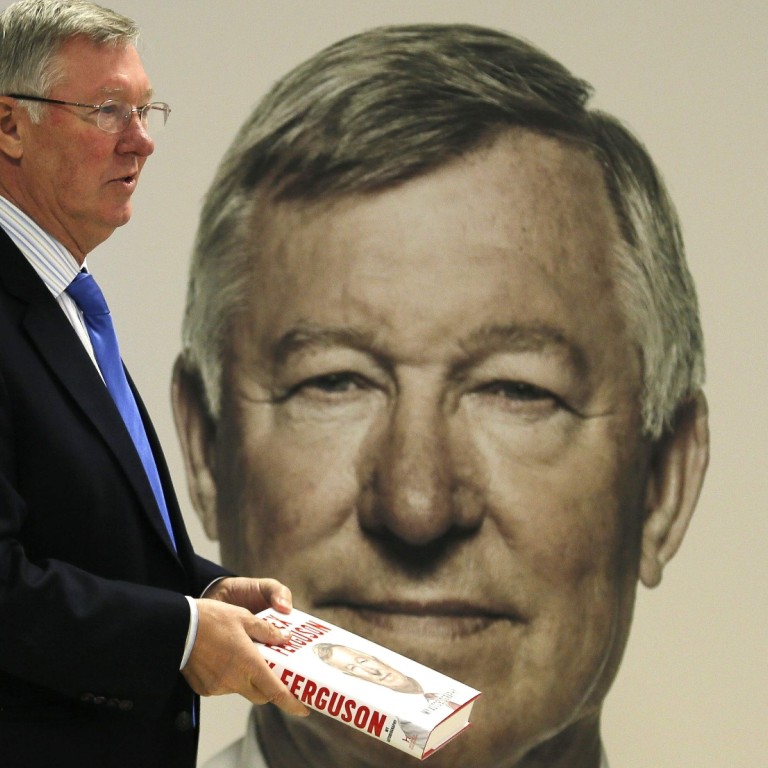
Autobiography reveals Alex Ferguson as the ultimate control freak
But CEOs and MBA students seeking to find his secret to unlocking the door to long-lasting success will be disappointed
CEOs and MBA students have been as eager to get their hands on Alex Ferguson's autobiography as sports fans.
Such was the unparalleled success of the formidable Scot during his 26-year spell at Manchester United, his account of what it takes to reach the top and stay there is arguably the most anticipated need-to-know business tale of the century.
Forget , and complete works of Warren Buffett, the suits are chomping at the bit for " ".
Inside they hope to locate the golden nugget of information which might unlock the door to the holiest of Holy Grails, aka long-lasting success.
Of course, sports fans are motivated by wholly different emotions. We want those other precious commodities: scandal, gossip and our strong opinions about United players confirmed by the man who knew them best.
Two core subjects dominate: control and loyalty.
And there is a third lesson. We learn what is meant when someone is declared a legend. Ferguson's formidable no-nonsense, dictatorial reign was evident when he first entered management at Scottish minnows St Mirren, in 1974.
A photographer from the local paper took pictures of the new manager arriving but captured the team captain making a rude gesture behind the new gaffer's back . Within days, the player was sacked.
Ferguson reiterates throughout that the key to success is always maintaining control, a trait some may call control freakery. Whatever it is, he exercises it to great extent over the final content of his life story, which was co-written by a sports journalist.
There are huge, important tracks missing, including the £82 million (HK$1 billion ) racehorse which nearly brought down the most successful club in the world. A major club shareholder owned the prized nag and gave a share to Ferguson, who later sued for a slice of the stud fees. The disastrous legal battle was eventually settled out of court but Ferguson dismisses the PR catastrophe in a single paragraph as a "misunderstanding".
Then there is the media blackout with the BBC. He refused all interviews after a documentary on transfer deals involving one of his sons. He brushes aside this seven-year war of attrition with: "We did agree to differ in the end".
But who are we to argue? From gritty Govan in Glasgow, a place where every penny, punch and show of loyalty counted, Ferguson writes about being underpaid even at the height of United's success.
Yet no figures are revealed. Underpaid by just how many millions, Alex? He does not dwell on the past. There appears to be no mention of his parents and he notes he was born in 1941 only when he writes about his retirement.
Clearly, the censors have the same deft hands as those found at Beijing's General Administration of Press and Publication department. Such significant omissions mean the real Fergie remains a mythical figure, an intentional ruse, one wonders.
He does though detail the many great players under his charge, including two of the most iconic, Roy Keane and David Beckham.
On the renowned rebel Keane (his most "difficult player" to manage), Ferguson writes: "The hardest part of Roy's body is his tongue." Trust and "loyalty" were abused when Keane, a player of "guts and blood", tried to use MUTV to "take down" players he believed to be less committed gladiators than him.
This isolated the dressing room and undermined Ferguson, who believed the club had helped the fiery Irishman with his off-the-pitch controversies and thus deserved loyalty in return.
While Keane remains a fans' favourite in the United pantheon, Ferguson constructs a portrait of a destructive, volatile presence increasingly reluctant to accept the manager's authority.
Then there is Beckham. Ferguson criticises the star's preoccupation with fame which made the manager feel uncomfortable "with the celebrity aspect of his life".
There was the Spice Girl wife, the silly hats, the illegible tattoos, the ridiculous sarongs, hairstyles and one beady eye and magpie mind on all that glitters in Hollywood.
Beckham's glib omnipresence jarred with Ferguson, a similar working-class boy made exceptional.
He details how Beckham's ballooning selfdom, insubordination and on-field indiscipline saw their relationship break down, irretrievably after Bootgate.
Though he would never say so, Ferguson's book confirms that Beckham is the greatest legend to ever grace Old Trafford's hallowed turf.
Before you start angrily kicking studded boots in disagreement, look up the definition for "legend"… "A person whose fame or notoriety makes him a source of exaggerated or romanticised tales or exploits."
That's Beckham . Yes, he was a good player as part of an exceptional team. But his mythology is far removed from reality.
He cannot be counted among the true Manchester United greats like George Best, Lou Macari, Norman Whiteside, Tommy Taylor, Nobby Stiles, Paul Scholes, Dennis Law, Eric Cantona, Bryan Robson, Bobby Charlton, Duncan Edwards, Peter Schmeichel, Ryan Giggs - the list goes on.
This assertion is confirmed by Ferguson in his book as he details how he became dismayed by the Frankenstein figure he had moulded from the modest schoolboy from Essex.
"David thought he was bigger than Alex Ferguson . . . you cannot have a player taking over the dressing room. Many tried … that was the death knell for him," he writes.
The suits and MBA students buying Ferguson's book to learn how to exploit their best marketing asset for as long as possible will be thoroughly disappointed.

